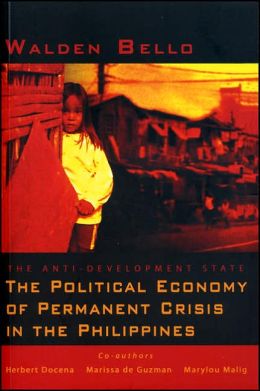By Walden Bello, Herbert Docena, Marissa de Guzman and Mary Lou Malig
Publisher: Zed Books (March 3, 2006)
Seven million Filipinos live or work abroad. One in five wants to emigrate. What has gone wrong in the 20 years since the popular ousting of President Marcos? In this analysis of the roots of failure, Walden Bello shows how the political system remains dominated by a competitive elite who oppose any significant attempts to address the country‘s huge social inequalities. He pinpoints the unravelling of land reform, the overwhelming power of private interests, the foreign debt service burden, WTO pressure to adopt free market policies, and how sustainable and environmentally friendly development has been consistently undermined by structural adjustment. The way out, he argues, is through the wholesale overhaul of the system of governance, leading to a new development strategy based on more, not less, state intervention, the domestic market as the driver of growth, and working together with other countries in the South.
Joseph Lim, Bureau for Development Policy, UNDP
and former Professor, UP School of Economics
Robin Broad, Associate Professor, School of International Studies, American University
James K. Boyce, Professor of Economics, University of Massachusetts, Amherst

